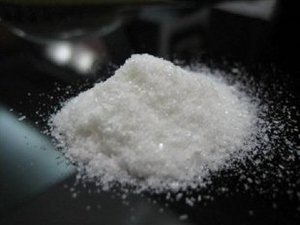The state health department is cracking down on a new breed of amphetamine-mimicking synthetic designer drugs under an emergency scheduling process made possible by the amendment banning synthetic cannabinoids like K2 earlier this year.

2C-I is a Phenylethylamine that the state of Michigan is working to ban because of its psychotic effects.
However, recently different derivatives known as 2C-I, 25i-NBOMe and 2C-X, among others, have been manufactured and re-engineered to avoid the chemical structures that have been deemed illegal by various government bodies.
“The legislative process is relatively slow and the way to change these chemicals is relatively fast,” said Dr. Brad Uren, assistant professor of Emergency Medicine at the University of Michigan Health System.
Common brand names include “Smiles,” which has been linked to the death of Johnny Lewis, the "Sons of Anarchy" actor who allegedly killed his landlady before falling to his death.

Dr. Brad Uren
Courtesy U-M
“There’s continually new derivatives of (Phenylethylamines) as there’s this war to substitute new chemical structures to avoid scheduling,” said Dr. Kirk Brower, professor of psychiatry at the University of Michigan and executive director, of U-M's Addiction Treatment Services.
For the past five months, the Michigan State Police have been tracking the use of the new Phenylethylamines derivatives across the state at the request of the health department. At every one of their labs, there have been confiscated substances that have tested positive as Phenylethylamines, said MSP Sgt. Chris Hawkins.
“We’ve queried our labs and identified a steady proliferation of this drug throughout the state once we started tracking it five months ago,” said Hawkins, who is the policy liaison for the MSP.
The Michigan Poison Control Center has reported 19 hospitalizations of people who have used the new Phenylethylamines for seizures and renal failure. To date, there have been no Michigan deaths attributed to the new designer drugs, but five people have died in the U.S. from use. Users of the new Phenylethylamines have also been reportedly physically combative with first responders, according to the state health department.
In Ann Arbor, the target group appears to be high school students, Brower said.
Between 60 to 80 percent of teens ages 14 to 18 in the Addiction Treatment Services program at U-M have either been offered a drug like "Smiles" or know how to obtain the substances, Brower said.

Dr. Kirk Brower
Courtesy U-M
Because the synthetic designer drugs are continuously altered to avoid the law, dosages are not well regulated and their effects are relatively unknown.
Each person who uses these synthetic designer drugs has a slightly different experience, Uren said, likely due to the lack of quality control of dosage and concentration.
“I would really not want anyone to be under the impression that (because) they’re not illegal yet they’re (safe),” Uren said. “It’s a bad class of drugs without a lot of benefits.”
When a patient arrives in the emergency room, doctors are only able to treat the various symptoms, which include psychosis. Additional symptoms include hallucinations, disorientation, renal failure, seizures, acute respiratory failure and central nervous system depression.
“Some of these, they don’t take effect right away, so you’re waiting and waiting and then you end up taking more than your body can really handle,” Brower said, encouraging people to go the emergency room to prevent permanent damage from an overdose.
Reports of use of new forms of Phenylethylamines have increased from 28 in 2006 to 228 in 2010, Brower said.
These new Phenylethylamines are packaged similarly to the way synthetic cannabinoids and cathinones were marketed, as mimicking the effects of marijuana in psychedelic-colored wrappers and tins, Hawkins said.
However, the new products like “Smiles” aren’t typically sold at smoke shops and party stores like K2 and Spice were, Hawkins said.
Users typically buy the new Phenylethylamines products online from foreign manufacturers, and either use it for their own consumption or distribute it stateside, Hawkins said.
The new Phenylethylamines like 2C-I can be a white powdery substance or be pressed into a tablet form.
People in possession of the new Phenylethylamines cannot be charged with use of a controlled substance at this point, but the health department is working to change that.
Under a new emergency scheduling process created this summer as a part of the state’s ban on synthetic cannabinoids, the Michigan Department of Community Health will be able to more quickly enact legislation to ban the drugs.
The state health department is encouraging parents to talk to their children about the new synthetic drugs, and to call the Michigan Poison Control Center at 1-800-222-1222 with any concerns.
Amy Biolchini covers Washtenaw County, health and environmental issues for AnnArbor.com. Reach her at (734) 623-2552, amybiolchini@annarbor.com or on Twitter.